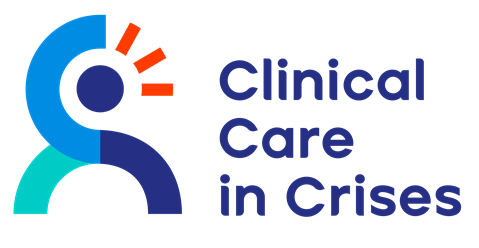CCC Newsletter - December 2023

Overview
Welcome to the latest Clinical Care in Crises Newsletter.
Project update
We have a lot to update you on since the last newsletter!
Firstly and most visibly, we have rebranded the project to a new name: “Clinical Care in Crises” (or “CCC” for short). Our vision remains unchanged: to improve health outcomes in emergencies by making WHO’s established clinical guidelines available whenever, wherever and by whomever. CCC describes the work to develop and operationalize SMART Guidelines (L1 to L4) across maternal and child care in emergency settings.
We have also more clearly distinguished the CCC Reference Application (L4) - built for Android mobile phones – from the rest of the project. The mobile app is now renamed as “Frontline”, to highlight the primary audience of health workers for which the app is designed. This rebranding also helps distinguish the digital content developed under CCC (L3) from the FHIR-native digital health applications (L4) that execute it. Frontline is just one of what we hope will become a healthy ecosystem of L4 applications, developed and supported locally in countries, and able to execute the same CCC clinical content (L3) that is localized to each setting.
Operational update
At the end of June, we achieved a major milestone with the completion of the first field pilot of the Frontline app (L4) in Iraq. This represented the first time a mobile app – built using the Android FHIR SDK and dynamically executing content authored in a FHIR Implementation Guide – had been tested in a healthcare setting.
The pilot started in April, with the adaptation our global DAK (L2) - based on the WHO Integrated Management Childhood Illness (IMCI) guidelines – to align it with the national chart booklet of the Iraqi Ministry of Health (MoH). This Iraq DAK (L2) was subsequently authored as machine-readable content (Iraq L3) - in the format of an HL7 FHIR ® implementation guide - so it could be executed with our reference app Frontline (L4), using the Android FHIR Software Development Kit (SDK).
An acceptability and feasibility pilot of Frontline (L4) was conducted in May 2023. Following training, 35 health workers at 10 primary health centres in two different governorates (Baghdad and Babil) used Frontline to conduct clinical consultations for sick infants and children under five.
Structured clinical observations evaluated practice before (n=39) and during implementation (n=46). End-user surveys captured experience of use, implementation barriers, and areas for improvement (n=28).
In total, 597 consultations were conducted using Frontline. Health workers reported the tool was extremely/moderately useful (84%) and very feasible/feasible to implement (73%). Guideline adherence improved, with danger sign assessment (2-59 months) increasing from 32% to 85% and Possible Serious Bacterial Infection assessment (<2 months) from 13% to 67%.
A number of key challenges were raised by users, included the speed of the application and its ability to manage illnesses beyond IMNCI. Recommendations on how to optimise and improve the development of each SMART guideline layer (L2 to L4) in the implementation approach in Iraq and globally were identified. And finally, priority areas for new features were identified, including tailored medication dosing, data synchronization improvements, and support for multi-user tasking.
New funding is now being sought to implement the recommendations, and to support the Iraqi MoH in moving to Phase 2 of the pilot to assess efficacy and effectiveness in 2024.
Other news
In Cameroon (the second pilot country), a clinical training of health workers from two emergency-affected regions on IMCI was completed at the end of August. The localisation of the clinical content (L3) to align it with the Cameroon national guidelines has been completed and testing of the content in the Frontline L4 app has progressed well. We are now aiming to conduct a Frontline acceptability and feasibility pilot in Cameroon in 2024.
Our global Digital Adaptation Kit (DAK), based on the IMCI guidelines with adaptations to emergency settings, is in the final stages of publication and we hope it will be published on the WHO website by the end of the year or in early 2024.
Useful links
Links to our global, Iraq and Cameroon artifacts within the CCC project are below:
L1:
Global 0-2m: https://www.who.int/publications/i/item/9789241516365
Global 2-59m: https://www.who.int/publications/m/item/integrated-management-of-childhood-illness---chart-booklet-(march-2014)
L2:
Available end 2023/early 2024.
L3:
Global: https://github.com/WorldHealthOrganization/smart-emcare
Iraq: https://github.com/WorldHealthOrganization/smart-emcare-irq
L4:
Frontline Reference App: https://argusgit.argusoft.com/who-public/emcare
Be the first to know! Join our mailing list to know more about Clinical Care in Crises
